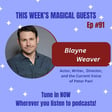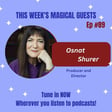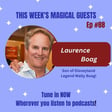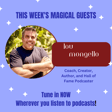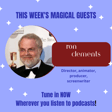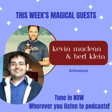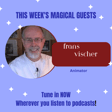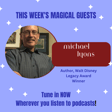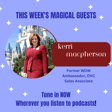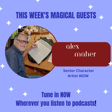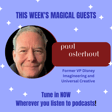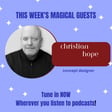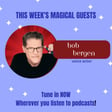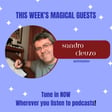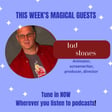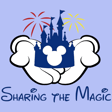Become a Creator today!Start creating today - Share your story with the world!
Start for free
00:00:00
00:00:01

Episode 65: Leslie Iwerks - PT 2
On this week's episode we bring you part 2 of our conversation with the one and only Leslie Iwerks as she share even more amazing stories from her storied career and more!
Be sure to check out Leslie's website HERE
DISCLAIMER: We are not an affiliate of the Walt Disney Company nor do we speak for the brand or the company. Any and all Disney owned audio, characters, and likenesses are their property and theirs alone.
Recommended
Transcript
Introduction to Disney Worlds
00:00:01
Speaker
Welcome to Sharing the Magic, the podcast that takes you on a journey through the enchanting worlds of Disney. Each week, we're joined by a special guest, whether they're a magician creating moments of astonishment or a Disney expert sharing the secrets behind the magic of the happiest place on Earth. Together we'll uncover the stories, inspirations, and behind the scenes tales that bring these worlds to life. So, get ready to be spellbound and transported to a place where dreams come true.
00:00:54
Speaker
Hey everyone, welcome to this week's episode of the Sharing the Magic podcast.
Leslie Iwerks Interview - Part 1
00:00:58
Speaker
Last week we brought to you part one of our interview with the one and only Leslie Iwerks. And this week we're going to bring you the second half of that conversation.
00:01:08
Speaker
So that's the long-winded answer to how the Imagineering story got. That was a great answer, though. That is fascinating. i had no way like I never even thought to put the timeline together about you know the fact that you made this essentially before Disney Plus came to you. and It wasn't like Disney Plus came to you and said,
00:01:26
Speaker
Hey, like make this original thing for us to kind of kick off the birth of Disney Plus. And I kind of view the Imagineering story as one of those main properties for Disney Plus. Like it was one, I think the first thing we watched, we were like, okay, let's put on Steamboat Willie. Like that was like.
00:01:41
Speaker
like the thing we had to watch and I'm pretty sure Imagineering's story was like the second thing we watched because it was so fascinating to kind of hear that story and you know I know you can't tell us anything about like what's coming in the future or anything but you're you're mentioning how you spent all this time you know first of all growing up with your with your your grandpa and your and your or growing up knowing your grandpa's story and growing up with your dad and then spending all this time with all these great Imagineers and doing the research and being inquisitive and wanting to kind of soak it all up but i'm not gonna ask you if there's a season two but is there more to the story is there more meat on the bone to cuz i feel like i want more like i'm so happy they gave you six hours but i would have been happy if they gave you twenty hours cuz i want more. Is there more to it that you were like i could do this again.
The Future of Imagineering Stories
00:02:29
Speaker
Matthew like I've been sitting here stewing on that question and Matthew literally took the words by my mouth because of all of the archival footage and all that all of the footage you actually got to handle and see yeah answer yeah is there a season two po potentially Yeah, I can't say say anything about that. But I do say think that and know that there's a lot of stuff to be told still. And there's a lot. I mean, it never ends. Imagineering never ends. It's just constantly dating and coming up with new stuff that
Darth Vader Helmet Gift from ILM
00:03:00
Speaker
can be documented. And it's it's a it's an endless pool of of opportunity and activity. Yeah. And I mean, the thing the thing, too, was that
00:03:12
Speaker
The first season was what, 60 years, 65 years worth of history. we like We had all that. So by this time you get to a season two, you're like, okay, well, we've only been five years in now. So whatever happens down the road, if if and when there is one, then it's going to be different. it's going to feel right it is you know I don't want to repeat what I just did. I want to innovate just like everybody else does.
00:03:35
Speaker
Right. That's what I was going to ask, because you've done so many different types of you know stories and so many different types of documentaries. Is there the interest there to to go back and do it? like Is that still something that you're like, I would devote another five years of my life to if I had to do it again?
00:03:52
Speaker
would you would you want to continue that story or is there like just so many things because you said it yourself you have an inquisitive mind you want to kind of go out and do all this different stuff are there other dream projects that you have that you want to do topics that you want to tackle and then if disney did come back and say hey we want you to do this again like would you jump on it Yeah, for sure. I mean, Disney's in my blood. You know what I mean? Like, I just, I love the Imagineers. I love that that company. I love everything about them. I've gotten to know so many people there. So many Imagineers have become good friends. You know, that I just, I've always felt trusted. I feel like it's family and I would very much like to be collaborating on on on what can be documented and and making sure it is being documented.
00:04:43
Speaker
So so she I see behind you, I believe that's a Darth Vader helmet. Yes. Are we, are you a Star Wars fan with the Darth Vader helmet behind you or is that, is there another meaning behind it?
00:04:57
Speaker
So I did a documentary on ILM called Industrial Light and Magic, Creating the Impossible. And that was another project that was um kind of brought by Lucasfilm when they saw Pixar Story. I interviewed George Lucas for that. And then Stars TV Station brought me in to do the ILM documentary. And so that was actually a 60-minute doc for Four Stars. and They got the blessing from George and the whole group there for me to go in and do exactly what I did for Pixar, but for ILM. And that was another like pinch me project because, you know, I documented the whole hit of history of ILM and I interviewed all those people, all the, all the great visual effects guys, Dennis Mirren and, you know, the legends of the visual and and special effects world.
00:05:48
Speaker
So that was fun going into the blue blue barn at ILM at the ranch and seeing all the stuff, all the great, you know, original Star Wars masks and props and the original, you know, Death Star who's there, you know, it's just like, I don't know, it was cool to to see that this was all just These are all just little props, you know, it's larger than life on the screen. It's so believable. But when you see the Death Star and you see the Millennium Falcon and you see these things that are just like, you know, not very big at all. You're like, ah that's crazy.
00:06:25
Speaker
It was fun. And um so anyway, at the end of that documentary, when that was done, ILM had a screening for it up at at the Presidio in their in their headquarters, and they invited George and all the top execs. And so, um and afterwards, so George had not seen the film yet. And so of course, I was a little nervous, but They had so they they were excited for him to see it. And so he's sitting in the middle of the theater and and, you know, I'm sitting kind of nearby, you know, and afterwards I did a Q and&A yeah on stage with the visual effects guys.
00:07:03
Speaker
so Dennis Mirren and you know uh god I'm blanking on everybody but it was just like the whole lineup that were in the film were on stage and I was asking them questions and we were bantering back and forth about the movie and about what was you know what was new and fresh in the movie for them but then also me asking them questions about their legacy and their history it was kind of a and nice sort of almost anniversary it wasn't an anniversary but it was just a a special night and they brought out they said well Leslie we have a gift for you and and and after this panel and they what wheeled out this covered cart with something on it and it was covered in black tarp and they wheeled it out to me and unveil it and it was the Darth Vader ah very cool that you see behind me in my office and it has a plaque saying from you know to Leslie Ira from the folks at ILM we are so thankful for the
00:07:52
Speaker
for how wonderfully you told our story. And we were very honored or whatever it says, but it's just so cool. And they all signed it. Like all the visual guys and George all signed it. And so it's just like this beautiful heirloom that I'll i'll always have.
00:08:08
Speaker
Great. I know you just did a DC story. So now we just have to next to their Darth Vader one, maybe get like an Iron Man helmet or a Captain America shield. So we get the MCU story. ah that That would be great. But, you know, get that hat trick and get all of the Pixar, Star Wars, Disney and get Marvel in there. So maybe one day.
00:08:28
Speaker
I mean, speaking of DC, we can't gloss over it because 100 years of DC, I know this is where Disney, but 100 years of anything, just like we celebrated our 100 years this last year. What was it like ah working with DC? Was that an undertaking with Warner? um Just like it may have been with the Imagineering story, because that's ah that's another true story, like a big story to be told. Did you treat that like any other ah you know film that you've done? Because it it is a big story.
00:08:56
Speaker
um You mean the DC story, super powered?
Directing DC Comics Documentary
00:09:00
Speaker
The DC story. um It was um daunting. It was a huge project. I mean, so I was, so after Imagineering, I got called into Warner Brothers and they asked if I would be interested in doing two new shows. One was the history of DC Comics and one was the history of Warner Brothers. And they were both basically back to back or kind of on top of each other. And one was a, they were both gonna be three-part series. One ended up becoming a four-part series.
00:09:29
Speaker
And it was a lot of work. And again, Mark Catalina, my production producing partner, ah was a huge dc is a is and was a huge DC fan. So he knew all about the history of DC. And he has a whole collection of DC comics. And I was like, okay, thank God, because I didn't know a lot about DC. And I thought for me to To do two series as a director, basically back to back on two huge brands was going to be really impossible. So I let Mark basically run with the DC show and we both co-directed. I executive produced it and and we co-directed it. and
00:10:07
Speaker
you know So he ran with that one and it was great. Jim Lee was just a ah wonderful man to work with, um the head of DC Comics and just so so kind and trustworthy. And and um I think it's just, there's so much there. there's so many There's so many comic book characters. There's so many storylines. There's so much history there. There's so many turning points in the company and the business.
00:10:32
Speaker
It was just trying to distill down what what are, again, the big turning points in the company's history. That's really where you have to start. What are the highs and what are the lows? and and Then as we went through and interviewed people, everybody gave us a lot of color and you know great interviews about the history and about their experiences. Linda Carter playing Wonder Woman, you know just fun interviews.
00:10:53
Speaker
so in yeah DC is not quite 100 years old. I think it's around 90 years old, but it's less enough. I have a question if you guys are done with the DC. um It's going back to Disney in your blood. So I'm envisioning your your little red blood cells, Mickey shape, just so you know. But I have a question because I did a little reading. So obviously Disneyland is your favorite, your park that you love, and that you know. What is your favorite ride?
00:11:24
Speaker
um I'd probably say ah Pirates of the Caribbean and Disneyland. Awesome. And then City World. ah Well, my first stop is to see my dad and grandfather's window on Main Street. so my ah Tell us about Well, they've they they got a ah joint window on Main Street and it's just awesome. like it's it's there' you know I forget what it says. You have to Google it. but you know, they're camera operators and, you know, it's um camera technicians. So it honored the two of them together on the window. And um so I like to stop there and just send a photo of it to my dad. say I love that. Oh, after you stop at the window, what's your favorite ride? Well, that's a hard one. I and probably say Haunted Mansion. It's fine. Awesome. I love the windows, too.
00:12:18
Speaker
I did that tour, but I didn't memorize them, so I'll have to look again next time. Do you remember where it is? Oh, you don't know. I'll Google it. Well, no, it's it's down probably almost to the end of Main Street as you're going towards the castle on the right. OK, there's like a balcony, a railing in front of it. I'm going to look for it. Yeah, it says, oh, my work's done. I works.
00:12:40
Speaker
So in Imagineering Story, you end your prologue with a statement that the creator of our podcast, Barry, has kind of taken to heart when he, when it comes to the aim of what we're trying to do. And you say for every person documented in this bio, there are thousands more who have contributed greatly behind the scenes. Could you just briefly talk maybe a little bit about that or Maybe, like, why do you believe that so many people, even if they never reach, like, the levels of fame as, like, Gurr or Sklar or Baxter, they still want to be a part of the Imagineering story? Like, what draws them to it?
00:13:16
Speaker
Yeah, so that was in my book, the manufacturing story biography. I think because there's just so there's so many people. OK, so let me just start by saying there is no other corporate DNA like Disney. There's there's just not. I mean, I've documented a lot of companies. I mean, I thought maybe Hearst, you know, when I did the Hearst documentary, 125 years of Hearst.
00:13:40
Speaker
that has a brand of William Randolph Hearst, et cetera, and it's expanded like Disney has. But the love that Walt Disney has created by not only the employees, but the fans is unheralded, right? I mean, it's it's just it's it's fascinating to me that whoever came up with the title, The Happiest Place on Earth, that was like success out of the gate. Like that's a very smart business plan right there.
00:14:08
Speaker
But, you know, what's fascinating to me when I talk to Imagineers is, A, you're every day you're creating happiness, right? And my my motto for the Imagineering story was Walt Disney created the happiest place on earth, but creating happiness is hard work.
00:14:27
Speaker
And that is the truth. And so everything that I've documented, you know, there's so much more you don't see that doesn't make the film, but it's it's it's really showing the the pressure of, you know,
00:14:42
Speaker
that goes on behind the scenes of budgets, of schedules, of technology, of can they can they live up to the expectations of the fans? you know How does this continue to operate over the next decade or two? you know All the things that go into, will the story stay relevant?
00:15:00
Speaker
are we Are we hitting all our marks? I think there's so many disciplines in Imagineering that there's just a wide variety of brilliant people in the company. And they all work together. They all collaborate. They all bring their A-game. But what they love is doing what what they're doing. They love innovating. They love creating something new. They love finding a way to bring joy to the audience, to the guests. And at the end of the day, that that's the goal, right?
00:15:28
Speaker
And the DNA of Walt Disney, who was this basically, you know, grown up child in a way, who just his whole goal was to to continue to innovate, continue to change, but tell stories that are that are charming, that are great characters, that are going to move audiences in ways and and bring families together.
00:15:51
Speaker
So the parks was the ultimate, and bring bring ah every discipline, every medium that he's done already and bring it to one place, which is in a three-dimensional form, a walk-through castle, rides that you can experience tangibly. And I think that that level of believability is first and foremost in that to to to the ongoing nature of Imagineering, it's it's constantly iterating on on imagination and realism and creativity and finding new ways to tell stories that you've never seen before. And that's what Walt did. And so that DNA thread stays true today. And I think it's it's also a huge testament to Bob Iger, Michael Eisner, Frank Wells, and then ultimately Bob Iger, who really gets the DNA of Disney and understands putting money where it needs to go and to do it with quality.
00:16:45
Speaker
is absolute is absolutely paramount to um the the company the company's success. And as we saw, you know, during COVID, when the parks were shut down, and how when they came back online and reopened, the the sheer joy from fans, was I was there in the opening of Disneyland.
Disneyland Reopening Reflections
00:17:05
Speaker
when it reopened after COVID and it was like, oh my God, you know it was unbelievable experience just to see fans coming through the gates and crying and overjoyed. And it there is something deeper about Disneyland and about Disney that is is it means something to people. And just being at D23 and you know being on a panel with Bob Weiss talking about Bob's panel. I mean, Bob and I were laughing backstage like, oh, is anyone gonna show up? You know?
00:17:32
Speaker
you And, and I mean it was like 1500 people packed audience, you know standing room only. And, you know, people love to know the history of the company and know what people did that is part of their, their.
00:17:47
Speaker
growing up part of their childhood, part of their adulthood, you know, the magic that people experience, they want to know the behind the scenes, they want to know the people who brought that magic to them. Right. So I think that's part of this whole thing as well. And and then and then ultimately what blew me away was being at the Honda Center during D23 and seeing 11,000, 12,000 people in the state in the stadium, just freaking out about all the announcements that Imagineering, you know,
00:18:15
Speaker
yeah was something and it's like the excitement is just never ending. you know Where they've run into problems is when they don't do the highest level of quality you know or just things that are, they have to always ride that line between innovating and in preserving the nostalgia that that fans still want. And that's that's always first and foremost of that balancing act, right?
00:18:42
Speaker
So anyway, I just think that there's there's a lot to unpack there as far as the the DNA of Disney and why so many Imagineers who through the years, thousands and thousands and thousands of people who've worked across the world to build these parks, it's a joy. it's it's a it's You have to get it. You know have to get why, which is to make people happy.
00:19:05
Speaker
I think that's a perfect spot for us to kind of wrap up our conversation. um but We have millions of more questions. We just don't want to keep you here until midnight your time, which is in, ah you know, a lot more. I'm happy if you want to ask a few more questions, more than happy, but as you guys are on the late schedule. So whatever it works with. Yeah. If anyone else has one, if you have a few more minutes, that would be great. If anyone wants to jump in. I saw a messenger. Somebody wanted to know what your favorite Disney snack was.
00:19:34
Speaker
Oh my God, my favorite Disney stack is by far my favorite is Dolwit. Like, I've got to go get a Dolwit. But I love the one with the, ah but it has a rum on it and stuff. You get it at the hotel, so good. Yeah, that's very good. i Don't you have a book signing coming up? Don't you have a book signing coming up? Yeah, is there any? It actually hasn't been announced yet, but it will be shortly, so it doesn't matter. I'm going to be going to Kansas City for the 100th Disney 100th.
00:20:04
Speaker
celebration there at the Union Station. So I'll be doing a presentation, a book signing, and I'll be doing a presentation on my work and the Imagineering story and hopefully some new stories about making the Imagineering story, but also um talking about my dad's work on the book that he wrote called Walt Disney's Ultimate Inventor, The Genius of um I-Works, the book that he wrote. wait a minute That will be I think October 28th, something like that.
00:20:33
Speaker
And OK, I don't know you're allowed to. can Can you share one little snippet or or so a favorite story of from your dad's book? Yeah, actually, that's going to be October 26 in Kansas City. Well, what I can tell you is my dad's book is is is a stunning book. It is so well laid out, so beautifully done. And thank you to Windy Left Con.
00:20:57
Speaker
in her team who really brought it to life. It's a coffee table book. It's gorgeous. It's it's basically his story from his days of Kansas City meeting Walt and theirre technical the technical innovations that Ubb did. So he was always known as an animator, but he really is ah out outlining all his technical achievements through all these projects through his career.
00:21:20
Speaker
I mean, from you know the animation and live action work with Alison Cartoon Land, that was largely his invention. um And he perfected that decades later with the traveling map process um at Disney, which allowed for the live action animation combination work with Mary Poppins, Saludos Amigos, Song of the South, all those films that had that those that combination. He was the inventor of that process.
00:21:48
Speaker
And it really, Walt loved it because he could bring live action animation together um in fun new ways. um But it also talks about his is work with the first color cartoon that he he did. And the first color cartoon was Fiddlesticks, Flip the Frog. He was the earliest inventor of the multiplane camera. It was a horizontal version, and unlike the vertical one that Walt built years later. But he was the first to bring you know real 3D depth to animation um in his cartoons in the 30s.
00:22:18
Speaker
And then ultimately took, when he returned to Disney in 40, he basically took a lot of what he had been doing in his own world with Walt and then on his own and now brought us straight into Disney and this 360-degree camera system to um the the zero animation Xerox process that literally saved Disney animation. um Because an Roy was you know, really ah fighting the costs of of making animated films. They were getting way too expensive. And he wanted to basically abolish the animation division. And my grandfather said, no, hold on. give me Give me a few days. Let me see if I can help you with this. And he figured out how to get the animator's drawings directly onto cells within a Xerox process that literally took up two rooms, two full rooms, what became his Xerox machine for animation.
00:23:10
Speaker
And that was 101 Dalmatians. and so that made um And Mark Davis speaks spoke to me about that, of just how great that was so that you didn't have to have an anchor redraw the the animator's lines. It was the animator's actual lines on the cell.
00:23:26
Speaker
So that was huge. um That saved the company. That saved Disney Animation. um But there are countless other you know effects and things like you know the Firefly effect in in Pirates of the Caribbean who created that and helped with the cam system for for the Disney animatronics that helped them move. you know Just all these things that he invented, thank God my dad spent the time to outline all that. And he had he has an amazing memory.
00:23:53
Speaker
for all the details, technical details that, you know, no one has. Like he's the last last guy remaining, I think today, maybe outside of Bob Gurr, who really knows the details of how these things got done and how they got made. So if you mistake can check it out.
00:24:10
Speaker
I was going to say between your dad and Bob. I saw Bob Gerst speak at Mousemeat 24 and between your dad and Bob Gerst. They're the last two guys that have any real knowledge of how the inner workings of Imagineering truly worked the way it did with Walt and your dad. Not your dad, but your dad and your grandpa. With that said, was there a particular reason why they chose the Windows on in Walt Disney World as opposed to Disneyland? You know, that's a good question. I think, um,
00:24:39
Speaker
I don't know. I have to ask my dad that. I don't know. um Maybe because my dad worked at you know on Walt Disney World. And so ground and so it was it made sense that they both worked on the same but the same park.
00:24:54
Speaker
I think that that makes a lot more sense than because when you brought it up because I when you associate like up and what you associate Mickey and the associate Disneyland and sometimes, you know, I forget about the windows on a main street in Walt Disney World of you know, how the all the other imagineers that have crazed imagineering. So that's just a curious question I had out of the window questions.
00:25:13
Speaker
Yeah. I mean, it's funny. People people have asked me, like, have you have you felt intimidated by your family, you know, your grandfather, your father, whatever, like growing up in that world? And did you want to be an animator or fall in their footsteps or what have you? And, you know, it's it's it's interesting because I never felt like I had to fall in their footsteps. I didn't have the technical gene. And I was an artist.
00:25:40
Speaker
funny Funny enough, I actually had an art business in high school, and I don't talk about this to anybody really. it's I don't think anyone really knows it, but I i was working at a drug store in high school, and it was like my first job was Miller's Outpost, which was a clothing store, and my job was to literally keep the clothing on the rack one inch apart, you know, like spaced.
00:26:05
Speaker
that thought circular rack, one inch apart. That was my entire job for days. And I was like, OK, I'm out. Like, I cannot do this. This is a waste of my brain power. And I'm out. I can't do it. So then I got a job at this drugstore and I was behind the counter, you know, and I had to do change and everything and work the cash register and give change. And I realized, oh, my God, I'm so bad at giving change. but yeah And then one day this woman Her name is Janet and she was painting the windows on the Christmas Santas and snowmen and stuff on the window for Christmas. I don't even remember when people so ah sometimes, but I was like, Oh my God, I can do a better Santa. I can do a better snowman. Like I can do that. So I immediately, I quit Jay Scott. I put a portfolio together and I started drawing like Santa's snowmen.
00:26:57
Speaker
you know, wreaths and and, you know, scenes and stuff like that. And I would put a budget together, like what a wreath cost, $35, what a snowman cost is like $75, $60, something like that, you know, whatever. And then I had like carbon copy receipts. And then I took this portfolio around and I was 16, I think, and I took it around all the suburban little shopping malls and I'd go door to door to door and I would ask for the owner and I would show them my book and say, would you like your windows painted?
00:27:25
Speaker
you know, for Halloween, Thanksgiving, Christmas. And I had like, you know, Halloween ghosts and I had Thanksgiving turkeys. And so I would go back and I said, you want to do the, you know, the Christmas as well. We want to, you know, book now for Christmas.
00:27:38
Speaker
but And so anyway, I ended up ah going across town and painting Santa's and snowmen everywhere across Burbank. And um you must have been very busy. I was very busy after school and I was running track and you know, I was on ASB and you know, running for school, you know, whatever.
00:27:58
Speaker
eighth grade president and stuff like that. But but I guess the reason I'm telling you this story is because i I realized at that point that I was becoming an artist and I had a cartoon side to me. And so I really started studying my grandfather's style and cartoons and like he had this really great, you know, whimsy about his characters. and And then I got hired by AMC Theatres to paint the Little Mermaid characters along the entire front of the Burbank AMC. And then they had me do Lion King and they had me do Dick Tracy. And I had to get it to perfect precision, like the perspective, the ratios, everything had to be right on. And then I got hired by Century City AMC and then they had like a zillion windows and they wanted all those painted.
00:28:45
Speaker
And it was just me doing it, right? And so this became this weird, like, art side where I was learning about the animator's work while painting their stuff on the windows. And um somebody came up and said, hey, I recognize your last name, because I'd write by Leslie, I works on the bottom of my phone number.
00:29:03
Speaker
And somebody came came, called me and said, are you related to UpiWorks? Like, your work is so good. And um he ended he was a director and he ended up hiring me to do his windows at his house. And um so he had me to do a a Mickey Mouse on on his window. And so there I am drawing Mickey Mouse and so whatever it was, Steamboat Willie or whatever. And I'm like, oh my God, now I'm drawing him, drawing my grandfather's thing on a window. But it was all like a learning experience.
00:29:31
Speaker
not only in like how to be a good artist, but also just business and learning to negotiate with different people, you know, and who would negotiate you down and who would be like, sure, no problem. Go for it. And who would just, you know, like ah all the different nationalities I dealt with and yeah you know, business owners. And I was reading this book called The Art of Negotiating, and it was like a dog eared that page to death, you know, of just how to negotiate. So I think that those high school years of just being an artist and taking our classes and learning about my grandfather's work during that time, and then making more money literally after school than my teachers were making.
00:30:10
Speaker
Wow, look at that. but So it was a fun time. And then from that, I ended up buying an editing system from a guy who was doing wedding videos. And he said, do you want to train with me? I need an assistant to do these wedding videos. And I hadn't taken a film class and knew anything about editing. And I said, sure. So then I started being his assistant on these wedding videos. And then I would go back and edit the stuff together on this half inch, this half inch deck. It was a state of the art system at the time.
00:30:36
Speaker
And he got burned out after about a year and he's like, do you want to buy my equipment? And I said, sure. So for 10 grand, I ended up buying his equipment and then started my own wedding business and doing my own wedding videos. And then from there, I was in USC, got into USC, and then I had the best editing equipment. So all the students would now come to my house to edit their films. oh that's So great.
00:30:56
Speaker
And so it all kind of weirdly dovetailed, you know, from one thing to the other. But then I started doing corporate films and, you know, ah commercial type stuff. And, you know, it just kind of went from there. And then I stopped painting and I just started filming. And then I was at film forever and not forever for like two two and a half years. And And then started as a director's assistant and then didn't have behind the mouth. So that's kind of how that weird trajectory happened. But it was just the business side that was really, I think, yes, what what do you do as ah as a young filmmaker, as a young director? I also think just learning the business and learning how to pitch yourself.
00:31:31
Speaker
is really is really important. If you go into a meeting and you want to pitch a documentary and you want to tell, like I've had to tell David Zaslav or Bob Iger or Steve Jobs why they should trust me to tell their story, you know, that's that's something you got to have confidence to be able to do, you know, over time. And then ultimately your body of work speaks for itself and you hopefully will continue to get more projects that are interesting.
00:31:55
Speaker
So, one one last question from me. Were you painting as much as i your grandfather was? Because I heard you say somewhere, I believe it was Martin Mall's podcast, that he was painting somewhere about 700, drawing 700 pictures a day. Were you painting as much as he was when you were painting?
00:32:14
Speaker
No way. Are you kidding? No. Very different medium. I was painting like six Sanas a day or something. But no, he was fast. I mean, he was really, Bill Nolan was considered the fastest anime. He was on the East Coast, right? And then my grandfather, I guess somehow they became friendly or something. And so he was very competitive and wanted to beat Bill Nolan's record, and he did. Send me like 700 drawings a day or 600 drawings a day.
00:32:42
Speaker
But you know a lot of those, when you look back at that, it's like you're just you've got Mickey's body, for for example, and then you've got an arm that's just the only thing moving. So you're that arm motion, you might do three different versions of the arm motion, and that's considered a drawing. Now, I'm not trying to you know short shrift his work. but No, as an animator, you have to draw like multiple drawings of a hand, a foot, an arm or whatever it might be. So, yeah, I could see that. But still, that's a lot of ah your your hand has to cramp. I can. A filmmaker doesn't have to do as much as you say drawing, but painting, I would I would assume it's it's still the same motion, same kind of aesthetic, but not as not as quick paced, I guess.
00:33:26
Speaker
Yeah, it's just amazing when you look back at all those guys, the nine old men and just what they were able to create with their own hand. It's to bring that animation to life was just genius. And while being able to bring in the humor and the story and the character development, like all that stuff was so But, you know, I wish which films were like that more now, you know, the charm of them. But um there's a lot of great films. I was just watching Inside Out 2 the other night. I hadn't seen it. It's been too long. And I love it. So good.
00:33:59
Speaker
My kids and I sat down the other night and watched it as well. And both my boys were like, wow, this is from Toronto. They're nine and six. And like you said, it's this beautiful animation. But to see where animation has come from to today and to know that your legacy has something to do with that, that that's something to be told within itself. Well, thank you. I appreciate that. I'm lucky to be here. I'm lucky to be part of it.
00:34:28
Speaker
happiness was Happy to continue telling the stories. I want to ask you one quick question because I know Jeff is getting ready for bed and you mentioned there's a lot of good stories out there and I don't want him falling asleep to your documentaries. But as some that is one some point why that is on me as somebody that is in an expert in documentaries and and I'm sure you have a fascination of watching documentaries, not just making them.
00:34:54
Speaker
What are, as Disney fans for us, of course, we're going to watch Imagineering Story and and everything that you're putting out, but what other documentaries are some of your favorites that maybe we should watch that, that Jeff could maybe fall asleep to tonight? Cause it's not yours. That's actually, that's good. Cause I'm to go to bed. Really? Did you see the Jensen doc? That's just one, a bunch of Emmys. oh Yeah. I have, I have not. Great.
00:35:20
Speaker
Well, yeah, check that out. um You know, so searching for Sugarman, one of my favorite all time docs. All right. Have you seen it? Have you seen it, Jeff? No, but I've heard of it. And so I'm I'm writing all of this down because I'm a I'm a documentary junkie. I just love them. Google that one. That one that's so darn good. The way it builds, the way the story is told is pretty genius.
00:35:49
Speaker
and and the fact that it was an untold story. Ooh, see, that's my fear. I love untold stories are the best kind of stories. That's why we're here as a podcast untold stories. That's how I feel like we're the behind behind. It should be like poo bears. for No, mother. Oh, untold stories. No, the best stories so like that. Oh, Jeff. I mean, poo.
00:36:17
Speaker
I would say that the other film that I've always loved in as hard as it is to watch is The Cove. i yeah I think I have seen that. The Killing of the Dolphins in Japan and and actually ILM was involved in that. They actually put in hidden cameras underwater in The Cove um to document the the slaughtering of these dolphins by the fishermen. and Anyway, it's a really hard film. It breaks your heart. um But the fact that they were able to help change the the rules and get legislation you know enacted hopefully that still is working to provide to that.
00:36:54
Speaker
Yeah, I mean, I think the the most important thing for documentaries is to to to to move the needle in some way, shape or form. And that's true. Yeah, we always I always say on this podcast story shapes life, story shapes life and what better mediums like documentaries. They it it tells the story that probably shapes life in a unique way that not much. I don't know any other. ah It's a medium that really does shape life. Exactly what you mentioned, it's like, well,
00:37:21
Speaker
You know, here's the story. Let me get it out there. And then things in life happen because of of that. And I think that's I think that's really cool. I know. I mean, ah my second film, second. I don't know. It was right. I was doing that along with Pixar, but Recycled Life about the people, thousands of people living in the largest landfill in Central America in Guatemala City um called Recycled Life. it It was a hard film to to do. I'm glad I did it when I did it because I was young. and crazy and um filming in this garbage dump for weeks on end, um seeing what I saw and seeing how impoverished people will eat trash out of the trash trucks and what what what is exciting to them and what is hard, you know, like it changed my perspective on life very early in my career that I've always been so much more appreciative than maybe I wouldn't have been had
00:38:13
Speaker
had I not experienced um what poverty really means.
Impact of 'Recycled Life' Documentary
00:38:17
Speaker
But we were able to with that film to raise three million dollars to help build schools in that area. And they have built schools and helped to get these children out of the garbage dump and actually get a proper education. So to me, when you can do something that's meaningful, tell a story that people don't know and then actually you use use that film as a as a way to raise money for an activist cause to actually should make a change in that environment is like the ultimate gift. Well said. Well said. Oh, anyway. There you go, Jeff. I mean, you've got a nice list there for I know. I play this. Hey, I love it. That's that's what gets me out of bed in the morning right here.
00:38:57
Speaker
And I also think that's a great jumping off point because it's about storytelling and change in the world. And if we can change the world through storytelling and documentary telling like Leslie has. And I think we're set up for success and in our lives overall.
00:39:11
Speaker
Yeah, I think it's important to tell your stories. You know, as my TED talk, it's like till when the old African proverb, when an old man dies, a library burns. And so many families have stories, but they'll, you know, there's no way to really tell them. So, you know, it takes people to have an initiative to get them on audio or get them on record and have it for the next generation.
00:39:34
Speaker
You know what would be interesting is, you know how Animal Kingdom, they have a bunch of different, like the International Fund for Animal welfare ah Welfare and Saving Animals from Extinction and Different Conservation. I know that when I've gone before, they'll have donations you can make and I bought a pen one time. I believe it had a giraffe on it, but that would be an interesting documentary. Yeah, for sure. I mean, we touched a little bit on that in the Imagineering story, but not to the level that it could be.
00:40:00
Speaker
because everyone loves animals. And complains that animal kingdom closes too early, but the animals have to sleep. I keep telling them. They have to sleep, yes. They have to go back to their cush little apartments. I know. Exactly. Air-conditioned rocks. Or heated rocks in the winter, right? Right. So they're pretty lucky. They don't know it, but they are. Yes, definitely.
00:40:27
Speaker
Well, thank you guys so much for having a fun chat. Yes, it's been tremendous. It's been tremendous. Thank you later. So you guys go fall asleep to a documentary. crystal Yeah.
00:40:39
Speaker
I feel right. I feel at peace. You don't even know.
00:40:45
Speaker
Can't wait. All right, Matt. All right. Well, again, thank you so much, Leslie. I mean, I'm sure Barry is going to try to get you to come back in the in the future to talk more about stuff. We super appreciate the time that you've spent with us and the stories that you've shared with us and the advice that you've given us. A truly fascinating story. we Again, we super appreciate you being here.
00:41:04
Speaker
And thank you again. We're going to tag as much stuff as we can on our show nights. We're going to put links to the books in your website, which is, uh, Leslie and co.com. So we I works in co.com. So we'll put all the links to that. So our listeners can kind of see more of what you're doing and have access to all of your work and stuff. And I'm sure they already know who you are, but, uh, it'll be there. So again, thank you so much. That's great. How fun. Well, I'm glad you're preserving the history.
00:41:32
Speaker
Thank you. we're ah We're glad you're doing it on a much better scale than we are. So different, but thank you guys. All right. You too. Bye.
00:41:47
Speaker
you do ah bye Thank you for joining us for another enchanting episode of Sharing the Magic. We are the Thinking Fans podcast, an entertainment show where education and entertainment collide each week. We bring you whimsical interviews with Disney guests who share their magical experiences and reveal how they are woven into the Disney fabric. Don't forget to hit that follow button to stay updated on our latest episodes.
00:42:13
Speaker
Spread the word and let your friends know they can tune in wherever they enjoy their favorite podcasts. You can also connect with us on Facebook, Instagram, TikTok, and ex, formerly Twitter, at at sharing the magic pod. Until next time, keep sharing the magic.
